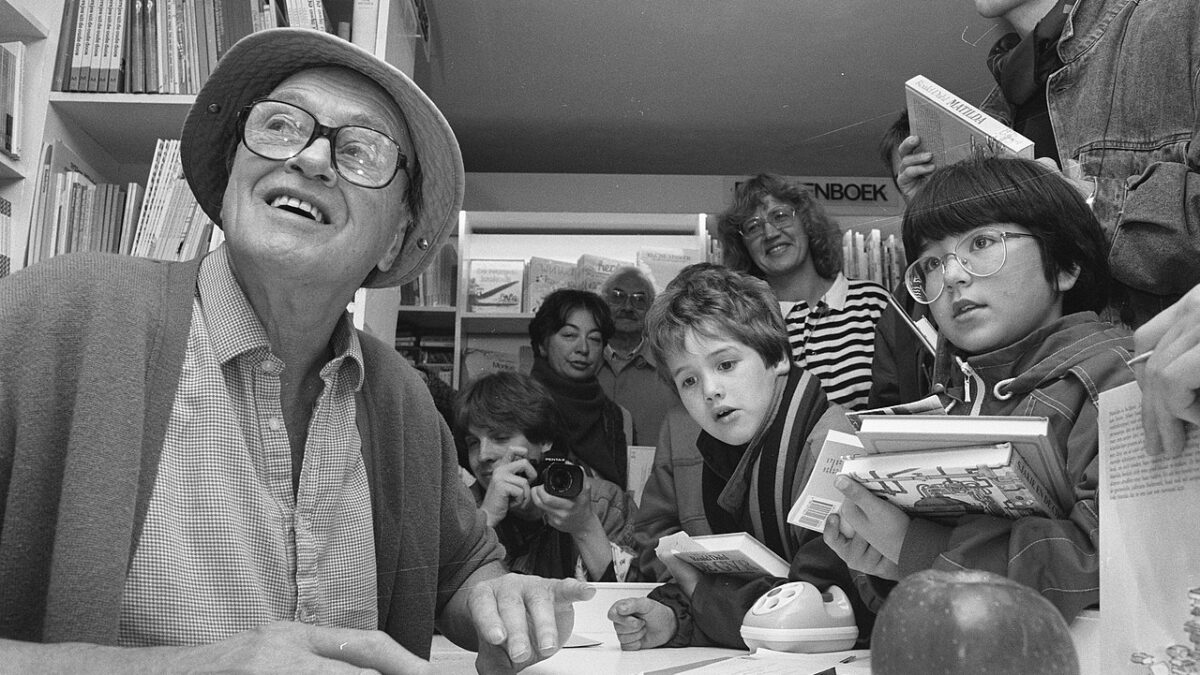It was recently announced that Roald Dahl’s much-beloved children’s books — which include “Charlie and the Chocolate Factory,” “The Witches,” “Matilda,” and “James and the Giant Peach” — were all being posthumously edited to reflect woke sensibilities. The changes are, frankly, appalling. Descriptions of characters as “fat” or “ugly” have been eliminated, gender-neutral language has been introduced, and laughable injections of political correctness have been made.
In one notable instance in “The Witches,” the description of the witches as bald has been altered and an all-new sentence added to communicate something Dahl obviously did not intend. The original text — “You can’t go round pulling the hair of every lady you meet, even if she is wearing gloves. Just you try it and see what happens” — now reads, “Besides, there are plenty of other reasons why women might wear wigs and there is certainly nothing wrong with that.” Heaven forfend that long hair continue to be associated with femininity! (You can find a more thorough rundown of what the various changes to Dahl’s books are in this Twitter thread.)
There are so many things wrong with this, it’s hard to know where to begin. Joyce Carol Oates, a major figure in the world of literary fiction, makes a key point. “Prose so radically revised by ‘sensitivity readers’ should be noted as collaborations. it is unfair to readers to be deceived into thinking that they are reading the original work,” she tweeted. “If Dahl is so egregious as to require such wholesale whitewashing (sic) why republish him at all?”
However, another major author, Walter Kirn, takes Oates’ observation a step further. Maybe on a personal level, Dahl was something of a mean antisemite, but what’s happening isn’t some concession made for a singularly problematic writer. “Writers may wish to rethink their ambitions. If their work should prove lasting, it may end up being tortured for all eternity,” Kirn observed. “This is not mere ‘sensitivity’ editing, by the way. This is blunt, agenda-driven rewriting. It is idea injection. And it will be continual once it starts.” (Also worth mentioning is that Salman Rushdie — who had ample reason to personally dislike Dahl — is also decrying the decision.)
However, what’s most disheartening about the Dahl episode is that the amount of outrage has been pretty minimal. Notably, the rights to Dahl’s work are owned by Netflix, which purchased them for $500 million in 2021, giving these Orwellian rewrites the patina of a cold business decision. Nor is this unprecedented. In 2021, Dr. Seuss Enterprises surrendered to politically correct pressure and stopped publishing several of Seuss’s works altogether, which caused quite a lot of public debate.
With Dahl, aside from the objections of a few major authors and some tut-tutting from British newspapers, there’s been nothing like the firestorm of criticism and media coverage that arose when the Seuss estate made its controversial decision two years ago. Without some major pushback to the precedent being set here, Kirn is probably correct in expecting politically correct rewrites to spread like wildfire.
But perhaps what’s most remarkable about the muted response to the Dahl censorship is that it pretty definitively shows the left really doesn’t care in the slightest about book bans, despite their posturing in the ongoing controversies over the last few years about politicized and inappropriate books finding their way into school libraries.
This battle has been drawn largely along partisan lines, and by now it’s pretty clear the left is being duplicitous. Let me see if I have this straight. A parent who complains about drawings of underage kids performing oral sex in “Gender Queer” — a graphic novel that liberal politicians and the media have gone to the mat to defend, including in school libraries — is a censorious bigot. But when a corporation such as Netflix, prompted by the publishing industry’s well-compensated legions of “sensitivity readers,” decides to posthumously edit one of the most beloved children’s authors of all time because every right-thinking person knows inchoate minds shouldn’t get the idea to describe people as “fat” — well, that’s a perfectly reasonable thing to do to protect kids.
This is the game — to stuff kids’ libraries with leftist revisionist history, dumbed-down critical theory masquerading as “anti-racism,” dubious gender ideology, sexually explicit material, and so on. When parents complain about what they find, they’re the ones the media portray as politically motivated.
It’s transparently duplicitous, yet these left-wing activists appear to largely be getting away with the attempt to reeducate kids along expressly political lines. There have been multiple episodes of school boards refusing to let parents read examples of what they found in their school libraries on the grounds it was too profane for a public meeting — even as the boards stifle attempts to remove inappropriate books from schools. “Don’t you find the irony in that?” one silenced parent asked the board.
Further, there’s a big difference in the approach to these issues. Parents asking for prudent, age-appropriate protections for what kids can access are not asking for supposedly offensive books to be “banned.” They will still be available to purchase and read elsewhere; parents just don’t want them in school libraries.
This is a marked contrast to what’s happened in the Dahl and Seuss cases. It’s not clear whether you will ever be able to purchase a new, non-bowdlerized copy of Dahl in the future. And not only did Seuss Enterprises stop printing several Seuss books altogether, eBay decided to ban all sales of used copies of the offending Dr. Seuss books. That’s actual book banning, as opposed to asking local schools and politicians to make responsible decisions about what belongs in kids’ libraries, which is a perfectly reasonable thing to expect.
The idea that books can be age-inappropriate used to be commonly understood. There’s a great scene in Martin Scorsese’s “Cape Fear” where the villainous character played by Robert De Niro tries to get revenge on the lawyer he blames for putting him in jail by coming on to his teenage daughter. Among other skeevy things, he tells her to read Henry Miller, who’s famous for his sexually explicit novels.
It’s quite clear De Niro’s character, a convicted rapist, is appealing to the daughter’s misplaced precociousness by recommending books he knows will sexually corrupt an otherwise innocent girl. This scene isn’t necessarily a rejection of the idea that Henry Miller’s books have literary value, so much as it’s revealing that 30 years ago, even the more liberal elements of Hollywood considered giving kids sexually explicit books despicable.
Despite all this, the media portrayal of who’s doing the book banning is conveniently backwards. The last few months in particular saw an outcry over the fact that Florida actually passed legislation dictating what was appropriate for school libraries. A video of a Florida school with empty shelves went viral, and the law occasioned a lot of misleading coverage that schools had to remove all books from shelves and get them approved or face felony charges. Local officials tried furiously to correct the false narratives, but that didn’t stop certain liberal school districts from overreacting and major national publications such as The Washington Post from publishing inflammatory articles requiring substantial corrections.
Of course, I’ve previously outlined many, many other reasons why the debate over “book banning” is dishonest and political and tries to exclude the will of parents. What’s really going on here is that the activists want to instill far-left values in children without having to defend those values publicly, and marginalize the parents who object. The goal is to capture your kids’ minds and keep you from doing anything about it.
Despite all the projection from the left about “book banning,” it’s clear they can’t win a debate that’s focused on what values are appropriate to teach children. Concerned parents should not be afraid to enter the fray. There’s just no way to defend the cognitive dissonance of bowdlerizing books to remove the word “ugly” while simultaneously pushing explicit sex as anything other than ideological programming.
No one who even tolerates, much less defends, what’s happening with Dahl’s books and the entire “sensitivity reader” phenomenon gets to accuse anyone else of “book banning.”









